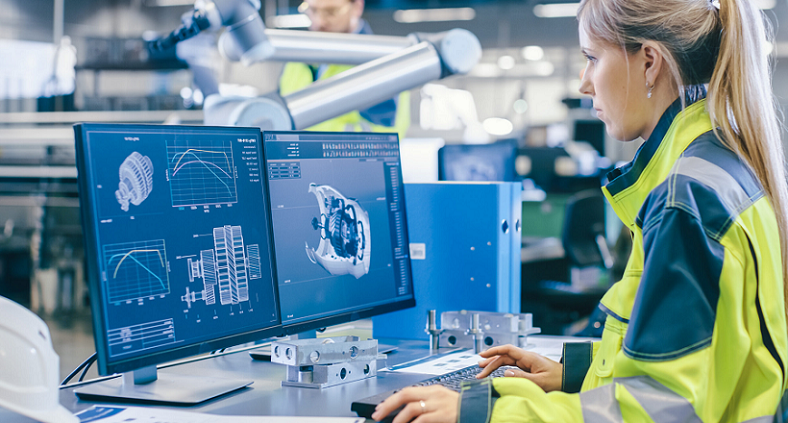
In today’s rapidly evolving world, futuristic technologies are transforming the way we live, work, and interact with one another. As these cutting-edge innovations become increasingly integrated into our daily lives, it’s crucial to understand their financial implications. Here we shed light on the economic benefits and risks associated with some of the most groundbreaking advancements, such as artificial intelligence, blockchain, space economy, and biotechnology.
Overview of Futuristic Technologies
As we venture further into the 21st century, a myriad of futuristic technologies is shaping our lives and the world around us in unprecedented ways.
Artificial Intelligence (AI)
Artificial intelligence refers to the development of computer systems that can perform tasks requiring human intelligence, such as visual perception, speech recognition, decision-making, and natural language understanding. With applications ranging from healthcare to finance and transportation, AI has the potential to transform countless industries, resulting in improved efficiency, cost reduction, and enhanced user experiences.
Blockchain and Cryptocurrencies
Blockchain technology is a decentralized, digital ledger that securely records transactions across multiple computers. It is the backbone of cryptocurrencies like Bitcoin and Ethereum, which offer a new way of conducting financial transactions with increased speed, security, and transparency. Blockchain is also finding applications in various sectors such as supply chain management, healthcare, and real estate.
Space Economy
The space economy encompasses commercial activities related to the exploration and utilization of outer space. This includes satellite services, space tourism, and resource extraction from celestial bodies like asteroids. As private companies like SpaceX and Blue Origin drive innovation in this sector, the space economy is poised to play a significant role in shaping our future.
Biotechnology and Genetic Engineering
Biotechnology involves the manipulation of living organisms or their components to produce useful products or processes. Genetic engineering, a subset of biotechnology, involves the direct manipulation of an organism’s genes. These fields have the potential to revolutionize agriculture, healthcare, and environmental conservation through advancements like personalized medicine, genetically modified crops, and synthetic biology.
Renewable Energy and Energy Storage
As the global demand for clean and sustainable energy sources grows, renewable energy technologies like solar, wind, and hydroelectric power are becoming increasingly important. Paired with advanced energy storage solutions, such as batteries and supercapacitors, these technologies can help reduce our dependence on fossil fuels, lower greenhouse gas emissions, and provide affordable and reliable energy for all.

Artificial Intelligence (AI)
Artificial intelligence has become a buzzword in recent years, and for good reason. AI is revolutionizing various industries by improving efficiency, reducing costs, and enhancing user experiences. In this section, we will dive into the world of AI, discuss its economic benefits, and examine the financial risks associated with this groundbreaking technology.
Overview of AI Technology
AI refers to the development of computer systems that can perform tasks typically requiring human intelligence, such as visual perception, speech recognition, decision-making, and natural language understanding. Machine learning, a subset of AI, involves algorithms that can learn and improve from experience, enabling AI systems to make predictions, solve problems, and adapt to new situations.
Economic Benefits of AI
Increased productivity: AI-powered systems can process large amounts of data and complete tasks at unprecedented speeds, significantly improving productivity in various sectors. From automating repetitive tasks to streamlining complex processes, AI allows businesses to operate more efficiently and allocate human resources to more valuable tasks.
Job automation: AI can automate jobs that are repetitive, time-consuming, or dangerous, ultimately improving workplace safety and efficiency. While job displacement is a concern, AI is also expected to create new job opportunities, particularly in fields such as data analysis, AI programming, and machine learning.
Improved decision-making: AI can analyze vast amounts of data to uncover patterns, trends, and insights that can inform better decision-making. This ability can be applied to a wide range of sectors, including finance, healthcare, and marketing, leading to more accurate predictions, enhanced customer experiences, and optimized business strategies.
Financial Risks Associated with AI
Job displacement: The automation of jobs due to AI could lead to significant job displacement, particularly in sectors with routine and repetitive tasks. This presents a financial challenge for both individuals and governments, as they must invest in education and training to prepare the workforce for new job opportunities in the age of AI.
Investment in training and education: Companies and governments must invest heavily in employee training and education to keep up with the rapid advancements in AI. Ensuring that the workforce possesses the necessary skills to work alongside AI systems is crucial to avoid widening skill gaps and income inequality.
Ethical concerns: AI systems can sometimes perpetuate or exacerbate existing biases, leading to unfair treatment or discrimination. Addressing these ethical concerns may require additional financial investment in the development of fair and transparent AI algorithms, as well as regulatory oversight and compliance efforts.

Blockchain and Cryptocurrencies
Blockchain technology and cryptocurrencies have emerged as transformative forces in the financial world, offering new ways to conduct transactions, secure data, and invest in digital assets. In this section, we will explore the basics of blockchain and cryptocurrencies, discuss their financial benefits, and examine the potential risks associated with these groundbreaking technologies.
Overview of Blockchain Technology
Blockchain is a decentralized, digital ledger that securely records transactions across multiple computers, ensuring that the data is tamper-proof and transparent. Cryptocurrencies, like Bitcoin and Ethereum, are digital assets that use blockchain technology to facilitate peer-to-peer transactions without the need for intermediaries such as banks.
Financial Benefits of Cryptocurrencies
Faster and cheaper transactions: Cryptocurrencies enable faster and often cheaper cross-border transactions compared to traditional banking systems. By eliminating intermediaries and streamlining processes, cryptocurrencies have the potential to reduce transaction fees and improve the efficiency of the global financial system.
The decentralized nature of blockchain technology means that cryptocurrencies are not controlled by any single entity, such as a central bank or government. This can lead to increased financial stability and reduced risk of censorship or manipulation by centralized authorities.
Cryptocurrencies offer a new and diverse asset class for investors. While they can be volatile, investing in cryptocurrencies can potentially yield significant returns for those who are willing to accept the risks involved. Cryptocurrencies can provide a hedge against traditional financial markets, offering a level of diversification for investment portfolios.
Financial Risks Associated with Cryptocurrencies
The value of cryptocurrencies can be highly volatile, with prices often experiencing sharp fluctuations over short periods. This volatility can present risks for investors and businesses that accept cryptocurrencies as payment, as the value of their holdings may change rapidly and unpredictably.
As cryptocurrencies gain mainstream acceptance, governments around the world are grappling with how to regulate and tax these digital assets. Regulatory uncertainty can lead to market instability and may affect the long-term viability of certain cryptocurrencies.
While blockchain technology is inherently secure, the storage and exchange of cryptocurrencies can be vulnerable to hacking and fraud. Ensuring the safe storage and management of digital assets is essential to minimizing financial losses and maintaining trust in the cryptocurrency ecosystem.

Space Economy
As humanity’s ambitions extend beyond Earth, the space economy has emerged as a rapidly growing sector with vast potential for innovation and investment. In this section, we will explore the concept of the space economy, discuss the financial benefits of space-related technologies, and examine the potential risks associated with this burgeoning industry.
Overview of the Emerging Space Economy
The space economy encompasses all commercial activities related to the exploration, utilization, and development of outer space resources. This includes satellite services, space tourism, and resource extraction from celestial bodies like asteroids. Driven by advancements in technology and the increasing involvement of private companies like SpaceX and Blue Origin, the space economy is poised to play a significant role in shaping our future.
Financial Benefits of Space-related Technologies
The satellite industry is a critical component of the space economy, providing vital services such as communications, Earth observation, and global positioning. As satellite technology advances, the potential for new applications and revenue streams continues to grow, offering investment opportunities in areas like satellite-based internet, remote sensing, and climate monitoring.
Space tourism is an emerging market that allows private citizens to experience the thrill of space travel. Companies like Virgin Galactic and SpaceX are developing reusable spacecraft designed to transport passengers to the edge of space or even orbit Earth. As the cost of space travel decreases and accessibility increases, space tourism could become a significant source of revenue within the space economy.
The abundance of resources found in outer space, such as water and precious metals, presents an enormous opportunity for businesses and governments. Mining asteroids, for example, could provide valuable materials for use in space-based manufacturing, construction, and life support systems, potentially reducing the need for costly resupply missions from Earth.
Financial Risks Associated with the Space Economy
The development and launch of space-related technologies often require significant upfront investments, which can be a barrier to entry for smaller businesses and startups. While the potential returns may be substantial, the high costs and long development timelines can deter investors and limit the growth of the space economy.
As the space economy is still in its infancy, predicting the financial returns of space-related ventures can be challenging. Investors must carefully weigh the potential rewards against the risks associated with unproven technologies, regulatory hurdles, and market uncertainties.
The legal and regulatory landscape surrounding the commercial use of outer space is complex and evolving. Companies operating in the space economy must navigate a multitude of international treaties, national laws, and regulatory agencies, which can create financial risks and uncertainties for their ventures.
Biotechnology and Genetic Engineering
Biotechnology and genetic engineering are increasingly at the forefront of scientific advancements, offering the potential to revolutionize healthcare, agriculture, and environmental conservation. In this section, we will delve into the world of biotechnology and genetic engineering, discuss their financial benefits, and examine the potential risks associated with these groundbreaking technologies.
Overview of Biotechnology and Genetic Engineering Advancements
Biotechnology involves the manipulation of living organisms or their components to produce useful products or processes. Genetic engineering, a subset of biotechnology, involves the direct manipulation of an organism’s genes. These fields hold the potential to bring about significant advancements in areas like personalized medicine, genetically modified crops, and synthetic biology.
Financial Benefits of these Technologies
Biotechnology and genetic engineering have the potential to revolutionize healthcare by enabling the development of targeted therapies, gene editing techniques, and regenerative medicine. These advancements can lead to improved patient outcomes, reduced healthcare costs, and the creation of new market opportunities in the pharmaceutical and biotech industries.
Genetic engineering can be used to develop genetically modified crops that are more resistant to pests, diseases, and environmental stressors, leading to increased crop yields and reduced reliance on pesticides and other chemical inputs. This can result in financial benefits for farmers, reduced environmental impact, and increased food security for the growing global population.
By leveraging genetic information, researchers can develop personalized treatments tailored to an individual’s unique genetic makeup. Personalized medicine has the potential to improve the efficacy and safety of treatments, minimize adverse side effects, and create new market opportunities in the biopharmaceutical industry.
Financial Risks Associated with Biotechnology and Genetic Engineering
The manipulation of genetic material raises numerous ethical concerns, such as the potential for unintended consequences, the creation of designer organisms, and issues related to privacy and consent. Addressing these ethical concerns may require additional financial investment in public education, ethical research practices, and regulatory oversight.
Developing biotechnology and genetic engineering solutions often involves significant research and development costs, as well as lengthy approval processes and clinical trials. This can make it challenging for companies and investors to recoup their investments and achieve profitability in a highly competitive market.
Biotechnology and genetic engineering products and processes are subject to strict regulatory scrutiny to ensure their safety and efficacy. Navigating the complex regulatory landscape can be costly and time-consuming for companies, and unexpected delays or setbacks can have significant financial implications.






